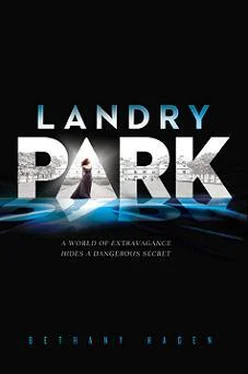But it was the only job out of all the work the Rootless did that paid money. Most Rootless were only given a ration card and were allowed to pick up food staples and limited household items, like nails and fabric, once a month. But the packers got paid, almost as much as a factory worker or a small shopkeeper, and the Rootless needed every penny of that money to make up for the rotten food the Rootless Bureau handed out and for the random taxes the gentry-ruled government levied whenever they felt the Rootless were growing too comfortable. Too lazy.
But as Jamie disembarked from the car, I didn’t think the building looked like a grudging concession to keeping a caste viable and alive. With its roof gleaming golden in the afternoon light and its wooden doors thrown open as if in welcome, the hospital looked downright friendly.
“I’m sorry to interrupt your tea,” Jamie apologized one more time. “I know you wanted to talk to Cara.” Behind him, two Rootless women sat crying on the steps, their dirty and tangled hair caked with blood. I thought of my callous words earlier. There’s always someone else…
Not for them, there isn’t.
“You said you were low on blood earlier,” I said, sliding over in the seat. “Can I help?”
Jamie blinked. “You want to donate blood?”
“Is my blood not good enough?”
“No,” Jamie said quickly. “It is very good. Rather too good, if you understand me. The gentry don’t usually donate blood here. In fact, they never do.”
I climbed out of the car and shut the door. “Please, Jamie. Let me help.”
With a baffled expression, Jamie led me inside, up the shallow steps and past the weeping women, and through thick wooden doors. Inside the marble-floored narthex, gold basins on pedestals dispensed bandages and packets of antibiotics instead of holy water. Bleeding, groaning Rootless leaned against the walls and slumped on the floor. More than one set of eyes locked on my bloodred hair and thin gold necklace.
“Landry,” one of them hissed. Jamie steered me away.
Inside the sanctuary, the curtained clinic rooms and boxes of cheap medical supplies were dwarfed by a high ceiling, deep blue and set with twinkling lights, like a summer sky full of stars. White pillars marched grandly down the center of the room, while ancient stained glass threw triangles of color across the curtains, the faces of the wounded, the feet of the shuffling patients in line.
At the front, something more permanent than a curtained room was constructed: a sleek white cube made of gleaming metal with a single door. A few of the Rootless men and women stood in line before it, and they were among those few in the old sanctuary who were not injured.
“Where the altar used to be—that is the fertility treatment room,” Jamie explained as we walked past it. “The serum is injected directly into the reproductive organs and is effective for three or four years. Each fetus is also inoculated, as a precaution.”
“All so they can watch their children suffer later?”
Jamie rounded on me. “And what should I do? Order them to stop the treatments? So they can then grieve over stillbirths instead of enjoying a few short years with their children? It is a step, Madeline. A step toward humanity for them. No matter what the reasons are for doing it, it’s still a good thing.”
He was right. And I realized that as much as he had defended my father and the other gentry the night of Cara’s attack, he did genuinely care for these people, his new charges.
I nodded and we moved on, behind the dais. I caught only a glimpse of Jamie’s office: a small room covered in books and paintings of his home in London, a two-story house on a narrow street. A picture of his mother and sisters, some of them with brown hair and some with black, but all with glossy curls, hung above his desk.
Just down the hall, a cramped and sterile-looking room contained piles of laboratory supplies. Jamie gestured to a chair.
I sat.
He rustled around for a moment then came over with a tray full of equipment. He tied a tourniquet around my arm, clucking when I winced, and prepared a hollow needle.
“Clench your fist, and I will count to three.”
I breathed in, nervous. The fevered illness of my thirteenth year had left me with a severe dislike of needles.
“One, two, three.”
“Ouch!”
“You should’ve done it on two,” someone said from the doorway.
It was a handsome young man, my age or a little older, with bright ginger hair and thick bands of muscle that swelled through his worn clothes. A scrape on his cheekbone and a dried trickle of blood along his jaw made me suspect that he’d been a victim of the recent raid. “She tensed as you said the word three , making it more painful.”
I had never heard a Rootless so well spoken. Father always talked about them like they were brutes, barely above the level of animal communication. Something about his height and vivid hair seemed familiar. With a flush, I realized that he changed the charges at Landry Park. He’d been on my estate several times a year, and I’d never thought to say hello or even to ask him his name.
Jamie finished hooking an IV line to a bag that would collect my blood. “It is my experience that ladies are uncomfortable with needles. I try to be accommodating of this.”
The man snorted. “Ladies don’t need special treatment.”
Jamie bristled a little at this. “Gentlemen believe otherwise, sir.”
“Gentlemen do, but real men don’t.” The man settled in a nearby chair and started rolling up his sleeves. “Take this girl over here. She’s here giving blood, even though she’s clearly gentry and clearly doesn’t belong here. But she’s brave enough to do it anyway. Would you call that weak?”
“That is not what I was implying.”
“And the women in my part of town—they work alongside of us carrying charges or sorting them. Some of the strongest are even packers. And today, when your police came and burned our houses and beat us, claiming to look for Cara Westoff’s attacker, our women fought alongside us. Would you call them weak?”
Jamie sighed. “No.”
The man flexed his arm. “I’m ready, doctor.”
Jamie moved over with another needle and bag.
The man turned and looked at me. “In my part of town, women are equals. We don’t put them on pedestals, and we don’t make them do our laundry or wash our dishes. We think of them as partners. Not princesses.”
His gaze was intense, a wash of heat and conviction. Goose bumps prickled on my arms as I realized that I wanted someone in my life to think of me that way. To think that I was strong.
“Madeline is not a princess,” Jamie defended me as he tied a tourniquet. “But she will run her family’s estate someday.”
“Maybe,” I mumbled, thinking of the university.
“Maybe,” Jamie conceded, and hung a bag from a pole. The man’s blood dripped in.
“What does that mean?”
“It means my father won’t let me inherit if I go to the university,” I explained. “I don’t know what will happen.”
The man rolled his eyes. “Such problems.”
“Be respectful, Ewan, or I’ll have to ask you to leave,” Jamie warned.
“I’m not being disrespectful,” Ewan said. “Look, all I’m saying is that she doesn’t need her father’s approval to live her life.” He looked at me again. “Be strong. Go do what needs to be done.”
“But without my estate…”
He shrugged. “I don’t have an estate and I’m still alive. And what about this gentlemanly doctor before us? He doesn’t have one either, and he seems happy enough chastising fellows like me.”
The funny thing was, I could almost believe it. Right now, talking with Ewan, I could believe in a life without an estate, without money, without gold necklaces and corsets. Life without the orchards, filled with fluttering petals in the breeze, without the white marble floors that were cold even in the summer.
Читать дальше












